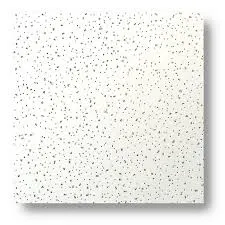10 月 . 14, 2024 03:07 Back to list
Composition and Properties of Mineral Fiber Ceiling Tiles Explained
What Are Mineral Fiber Ceiling Tiles Made Of?
Mineral fiber ceiling tiles are a popular choice for commercial and residential buildings due to their durability, sound absorption capabilities, and ease of installation. Understanding what these tiles are made of not only helps in recognizing their benefits but also elucidates why they are favored in various architectural applications.
Composition
Mineral fiber ceiling tiles are primarily made from a combination of natural and synthetic materials. The core components typically include
1. Mineral Wool This is one of the primary ingredients, often derived from rock or slag, which is heated and spun into fibers. Mineral wool is known for its excellent sound-absorbing properties and fire resistance.
2. Gypsum Another critical material in the composition of mineral fiber ceiling tiles is gypsum, which is a soft sulfate mineral composed of calcium sulfate dihydrate. Gypsum adds strength and is an effective fire retardant, enhancing the safety profile of the ceiling tiles.
3. Cellulose Cellulose fibers, often sourced from recycled paper products, contribute to the acoustic performance of the tiles. They help in reducing sound reverberation within spaces, making them suitable for offices, schools, and other environments where noise control is essential.
4. Synthetic Fiber Additives In many cases, manufacturers include synthetic fibers to enhance certain properties of the tiles, such as their structural integrity and moisture resistance. These synthetic materials can be derived from a variety of plastics or polymers.
5. Perlite or Vermiculite Some mineral fiber ceiling tiles may incorporate perlite or vermiculite, which are lightweight volcanic glass minerals. These materials improve insulation and fire resistance without adding significant weight.
6. Binders and Coatings To hold all these components together, binders are used, typically made from latex or similar polymers. These binders increase durability and can also contribute to the tiles' moisture resistance. Additionally, tiles may be coated with a finish that adds aesthetic appeal and enhances their functional characteristics, such as enhancing light reflectance.
what are mineral fiber ceiling tiles made of

Benefits of Mineral Fiber Ceiling Tiles
The unique composition of mineral fiber ceiling tiles affords numerous benefits that make them a preferred choice in construction and renovation projects.
1. Sound Absorption The porous nature of mineral fiber materials enables effective sound dampening, leading to quieter, more comfortable indoor environments. This feature is particularly beneficial in open-plan offices, auditoriums, and classrooms.
2. Fire Resistance Mineral wool and gypsum provide excellent fire resistance, making these tiles a safer option for various building applications. They help to slow the spread of fire, providing crucial time for evacuation.
3. Thermal Insulation The composition of these tiles aids in thermal insulation, helping to maintain optimal indoor temperatures. This energy efficiency can lead to lower heating and cooling costs.
4. Light Reflectance Mineral fiber ceiling tiles can be manufactured with surfaces that reflect light, helping to improve illumination within spaces and reducing reliance on artificial lighting.
5. Sustainability Many mineral fiber ceiling tiles are made from recycled materials, making them a more sustainable choice in construction. Their longevity and low maintenance requirements further contribute to their eco-friendliness.
Conclusion
Mineral fiber ceiling tiles are a versatile and functional building material, composed of a blend of natural and manufactured substances that deliver exceptional performance in sound absorption, fire resistance, and thermal insulation. Their unique composition not only benefits the design and aesthetics of spaces but also promotes sustainability. As building standards evolve and the demand for efficient and environmentally friendly materials grows, mineral fiber ceiling tiles are likely to remain an integral part of modern construction practices.
-
Revolutionizing Interior Design with Ceilings t grid Suspended SystemNewsOct.29,2024
-
Revolutionizing Ceiling Design with ceiling access panel with Gypsum Tile WaterproofNewsOct.29,2024
-
Revolutionizing Interior Design with PVC Gypsum Ceiling: A Comprehensive GuideNewsOct.29,2024
-
Elevating Interior Design with High quality Mineral Fiber Ceiling TilesNewsOct.29,2024
-
Revolutionizing Interior Design with PVC Gypsum Ceiling: A Comprehensive GuideNewsOct.29,2024
-
Elevating Interior Design with High-Quality Mineral Fiber Ceiling Tiles: A Comprehensive GuideNewsOct.29,2024







